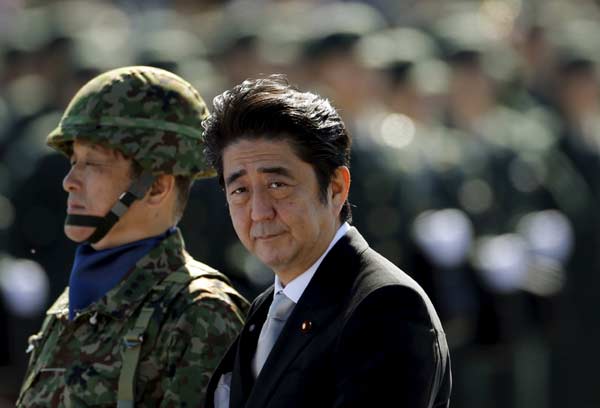Japan's new defense bills pose threat to regional peace
(Xinhua) Updated: 2015-05-15 13:06
 |
|
Japanese Prime Minister Shinzo Abe (R) reviews Japanese Self-Defence Forces' (SDF) troops during the annual SDF ceremony at Asaka Base in Asaka, near Tokyo, in this October 27, 2013 file photo. [Photo/Agencies] |
TOKYO -- The cabinet of Japanese Prime Minister Shinzo Abe approved a package of defense bills on Thursday and eyed their approval in the Diet before July.
If enacted, the legislations will give Japan's Self-Defense Forces (SDF) much greater power by removing geographical restrictions on its overseas operations, and allow the SDF to fight "under certain conditions" even if Japan itself is not attacked.
Those bills indeed are "war legislations," that turn Japan toward militarism, according to Yoshiki Yamashita, head of Japanese Communist Party's secretariat. The bills met strong opposition at home as they contradict Japan's long-cherished pacifist constitution, marking a complete overhaul of Japan's post- war exclusively defense-related policy.
More than half, or 52 percent, of respondents in a Nihon Keizai Shimbun survey in early May opposed Abe's bid to hastily enact the bills during the Diet session.
However, given the ruling Liberal Democratic Party and its junior coalition partner Komeito's overwhelming majority in the parliament, they are likely to get a greenlight in the Diet.
At that time, Abe's ambitions since he took office in December 2012 to "lift the ban on collective self-defense, revise Japan-U.S. defense cooperation guideline as well as expand the SDF's role overseas" will finally be guaranteed by law, thus building a hotbed for the conservative and right-leaning trend in Japan.
According to the proposed bills, the definition of how and when Japan could exercise the right to collective self-defense or aid its allies is very vague, which means they are open to all sorts of interpretations.
It's particularly alarming that Japan will, in this way, shake off the shackles imposed by its war-renouncing constitution since the end of World War II.
As a past aggressor which brought enormous pains and sufferings to its Asian neighbors, Japan is still reluctant to reflect on its war-time past and owes the victimized countries as well as the world an apologize after the WWII ended 70 years ago. Instead, the Abe government is trying to deny or whitewash its past atrocities by enshrining war criminals and rewriting school books.
Undoubtedly, the revival of Japan's militarism raises concerns among its neighbors who were brutalized by Japan's Imperial Army during WWII. And the new defense legislations, which allow the Japanese SDF to fight abroad, will inevitably pose a threat to the regional peace and keep those countries alerted to the assertive move.
If Japan really want to function as a "normal country," it should first walk its talk to win respect and reconciliation from its neighbors who had suffered immeasurably.
The war-renouncing constitution, one of Japan's solemn commitments to peace for the international community after WWII, has refrained the country from being directly involved in any war again for 70 years, So, it should by no means be diluted or downplayed.






